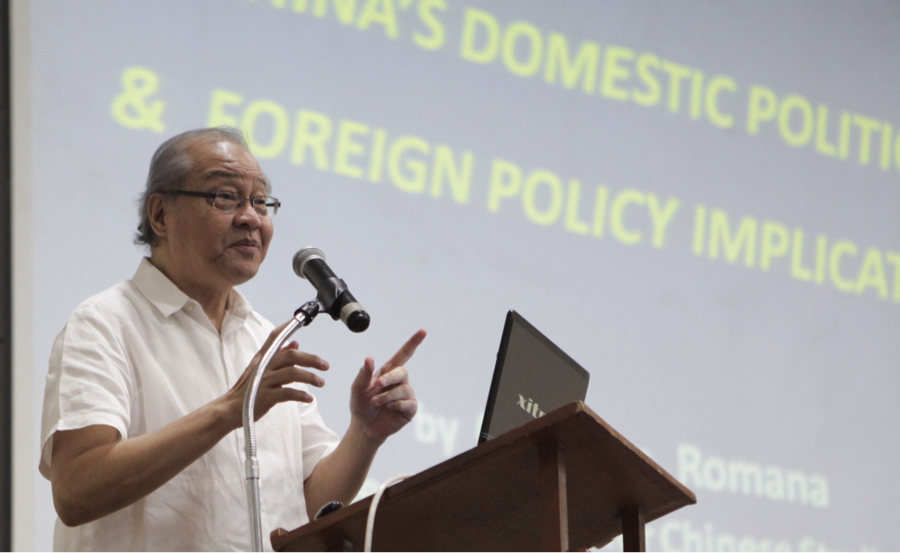Speeches
China's Complex Diplomacy and Its Challenges for the Philippines
- Details
- Written by: APPFI Secretariat
- Category: Speeches
Q & A with Jose Santiago “Chito” Sta. Romana, former journalist, lecturer, and ambassador-designate
to the People’s Republic of China.

Photo taken during In Search for a China Strategy, a symposium organized by Asia Pacific Pathways to Progress Foundation Inc. and UP Asian Center last August 17-18, 2016.
[NOTE: The answers to this Q & A draw in large part from a published article by the interviewee, titled “China’s Foreign Policy and the Territorial and Maritime Disputes Between the Philippines and China”, which appeared in A Quest For Regional Solutions: Challenges And Prospects For Conflicts In The South China Sea. Benedikt Seemann and Marie Antoinette De Jesus, Eds. Makati City: Konrad Adenauer Stiftung, 2016, pages 36-49.]
IN YOUR VIEW, WHAT IS THE ROOT CAUSE OF THE PROBLEMS BETWEEN CHINA AND THE PHILIPPINES IN THE SOUTH CHINA SEA?
The root cause of the problems between the Philippines and China has to do with the territorial and maritime disputes between the two countries. There are several dimensions to these disputes: the first is the issue of territorial sovereignty and the competing claims between the two countries over Scarborough Shoal and some maritime features in the Spratlys.
The second is the issue of maritime rights and jurisdiction: the status of these contested islets, rocks and shoals, and their respective maritime entitlements, if any, and the competition for economic resources, such as fisheries, oil and natural gas, in the surrounding waters.
Why the Hague Ruling Matters
- Details
- Written by: Florence Principe
- Category: Speeches
Click here to Watch CNN Philippines' interview with Mr. Chito Sta Romana.
Interviewer: How does this ruling affect relations between China anad the Philippines?
Chito Sta Romana: It’s a challenge and an opportunity. A challenge because how to convert this legal document – the legal advantage – into reality. How to convince the Chinese to accept this and to abide by this ruling. But the opportunity is that we are facing the Chinese now with a new administration. The new administration has signalled a less adversarial, more concillatory approach to China – so, that may work in the Philippines’ favor. However, expect the Chinese right now to take a hard line. Expect a barrage of media, diplomatic… a lot of hot words in the coming few days as they take a defiant stand. This is a bit reminiscent of what happened in the Tiananmen Square, when the whole world practically was condemning China, and the Chinese took their position. Until eventually, there was an economic boom and the situation turned. So, I think we’l see more of that – the Chinese will pay a price to their image but it will create ripples in Chinese society that could eventually work in our favor.
What's next for PH, China after court ruling?
- Details
- Written by: Florence Principe
- Category: Speeches
ABSCBN's interview with Professors Herman Kraft and Chito Sta Romana, and Atty. Harry Roque after the Hague's release of the arbitration ruling on the South China Sea.
The Silk Belt Road, 21st Century Maritime Silk Road and Regional Connectivity: An Interview With APPFI Vice President Antoinette Raquiza
- Details
- Written by: Florence Principe
- Category: Speeches
Dr. Antoinette R. Raquiza, APPFI vice president and associate professor at the University of the Philippines Asian Center, was interviewed by the Fudan Development Institute during the “Building the Belt and Road: Connection, Innovation and Sustainable Development: Dialogue and Silk Road Think Tank Association Conference,” held from 22 to 24 February 2016, in Shenzhen, China. The interview is featured below with permission from the FDI.
Interviewer: Lu Ting (LT)
